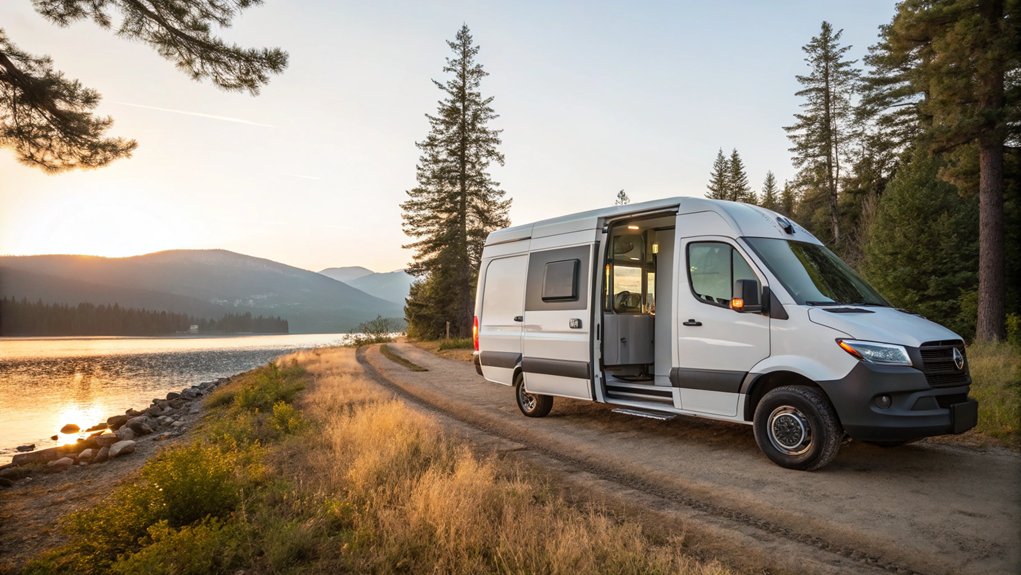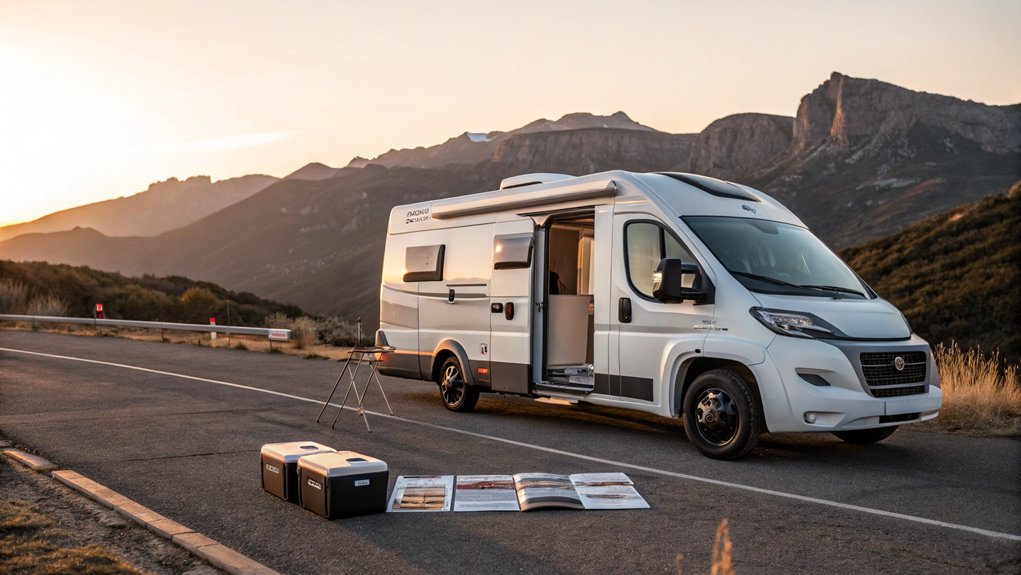Choosing between a new or used van for vanlife depends on your priorities. If you’re after customization, a warranty, and advanced safety features, new vans offer these but at a higher upfront cost and insurance. Used vans, while cheaper upfront with potential bargains, may present unknown mechanical issues and lack warranties. To decide, assess your financial comfort with risks and insurance increases, and your willingness to trust a used purchase. There’s a lot more nuanced detail to uncover beyond this summary.
TLDR
- New vans offer customization and modern safety technology but come with a high upfront cost and potential depreciation.
- Used vans provide cost savings and immediate availability but may have unknown mechanical issues and limited warranty coverage.
- Warranty protection on new vans guards against unexpected repairs, whereas used vans often lack such security.
- Insurance premiums are generally higher for new vans, while used vans typically incur lower insurance costs.
- Consider having a mechanic inspect a used van to avoid hidden issues and ensure a sound investment.
Advantages of Buying a New Van

Purchasing a new van for your vanlife adventure offers several compelling advantages.
New vans provide the opportunity for complete customization—tailor the layout, components, and colors to fit your unique needs perfectly. With a warranty, you’re covered against unforeseen mechanical issues, granting peace of mind.
Designed for longevity, these vehicles boast durability and reliability, often surpassing used models thanks to brand-new parts and systems. Modern safety technology enhances your driving experience, offering advanced features that make your travels more secure.
Though the initial cost might be higher, new vans typically require less frequent maintenance and repairs, saving you money over time.
Choosing a new van guarantees a reliable, customized, and safe journey, making it a wise investment for your adventures.
Drawbacks of Buying a New Van

While the allure of a new van is undeniable, it’s important to evaluate some of the challenges it presents. Opting for a new van often means grappling with a high cost, which can range from $50,000 to over $150,000.
Here’s what to take into account:
- High Cost: Compared to used vans, the upfront investment is considerably higher, impacting your budget.
- Insurance Premiums: New vans come with higher insurance premiums, adding to ongoing expenses.
- Wait Times: Factory build processes can delay your vanlife adventure, leading to frustration and uncertainty.
- Depreciation: A new van can lose up to 20% of its value in the first year, which is a notable drawback if you plan to sell later.
These factors highlight why some choose used vans.
Benefits of Purchasing a Used Van

When considering the leap into vanlife, opting for a used van offers several compelling benefits that shouldn’t be overlooked.
First, buying a used camper van can save you a substantial amount of money compared to new ones, often costing between $5,000 and $25,000. This is a huge advantage in the Buying a New vs Used debate.
Additionally, if you find a fully converted van from previous owners, you can hit the road immediately, avoiding the wait time for custom builds. Insurance costs are typically lower for used vans, further reducing your expenses.
With diligent research and inspections, you might discover a well-maintained gem at a bargain. This allows you to experience van life with minimal financial risk before deciding on a custom build.
Downsides of Purchasing a Used Van
Though diving into vanlife with a used van can be enticing, there are considerable downsides to reflect on that might impact your journey.
Owning a used van often means dealing with uncertainties and expenses that could derail your travel plans. Here’s what to think about:
- Mechanical Issues: Unknown problems might surface, leading to costly repairs that aren’t always budget-friendly.
- Previous Conversions: The quality varies; subpar wiring or plumbing can pose safety risks and require immediate attention.
- Warranty Coverage: Typically limited or nonexistent, leaving you responsible for any financial burdens from necessary repairs.
- Maintenance Issues: Older vans may suffer from rust and deferred maintenance, necessitating replacements like brakes or tires, which add to initial costs.
These factors could considerably affect your vanlife experience.
Key Tips for Buying a Used Van
Starting on the journey to buy a used van doesn’t have to be intimidating if you arm yourself with the right strategies and insights.
First, always have a mechanic inspect the van for hidden mechanical issues. It’s essential to obtain a CARFAX report to review the vehicle’s history, guaranteeing there are no accident or title problems.
Discuss maintenance records and known problems with previous owners or dealers to understand the van’s condition better. Bringing a knowledgeable friend can offer a fresh perspective during the inspection.
Research the common issues and features of the specific van model you’re considering. This helps assure it meets your needs and avoids costly surprises.
Weigh the pros and cons of each potential purchase to make an informed decision.
Effective Strategies for Finding a Van
After mastering the art of evaluating used vans, it’s time to shift your focus to effective strategies for finding the perfect vehicle.
Here’s how you can enhance your buying a van experience with these tips:
- Explore Dedicated Platforms: Start with Conversion Trader and Van Life Trader, which specialize in used vans and pre-built van conversions.
- Conduct Market Research: Be patient and dive deep into current trends and pricing. This knowledge will help you spot a good deal.
- Negotiate Price: When dealing with a used van, don’t hesitate to negotiate. Sellers might lower the price for serious buyers.
- Ensure Thorough Inspection: Get a CARFAX report and bring a mechanic for a detailed vehicle inspection to avoid hidden pitfalls.
Stay informed and strategic!
Exploring Old Vs New Vans for Van Life
When deciding between an old or new van for van life, consider what you value most in your travel experience.
Buying a New vs Used Van involves weighing the benefits of mechanically simpler engines found in older models, which are easier to maintain and repair. If you’re hands-on and seek a converted camper van with fewer electronic complexities, a used van might suit you.
However, new vans offer modern comforts like advanced safety features and better fuel efficiency, enhancing your journey. While older vans can be cheaper upfront, they might require more maintenance, increasing the financial burden.
New vans often come with warranties, reducing repair costs and providing peace of mind. Ultimately, balance reliability and comfort based on your preferences.
Financial Considerations for Van Purchases
As you weigh the pros and cons of old versus new vans for your van life journey, financial considerations play a pivotal role in your decision-making process.
New vans come with high upfront costs, sometimes exceeding $150,000, and steep depreciation, losing value immediately after purchase. On the other hand, used vans are more budget-friendly, with prices ranging from $5,000 to $25,000 and tend to retain value better over time.
Consider these key points:
- Ownership Costs: New vans may require financing that can exceed $257,000, while used vans generally incur lower financing expenses.
- Maintenance Costs: New vans average $200 monthly, but older vans may need frequent, yet cheaper, repairs.
- Insurance Rates: New vans often have higher premiums than used vans.
- Depreciation: New vans experience rapid value loss; used vans offer better value retention.
Frequently Asked Questions
Should I Buy a New or Used Van?
Consider your budget, travel plans, and mechanical skills. New vans offer reliability and customization but cost more. Used vans are cheaper and faster to acquire but may need repairs. Weigh the trade-offs to suit your lifestyle.
Is Van Life Worth It Financially?
To thine own self be true when considering van life financially. Analyze your travel frequency and usage. If you’re only hitting the road occasionally, the cost might outweigh the benefits. DIY conversions could save you substantial cheddar.
What Mileage Is Too High for a Used Van?
When evaluating a used van, aim for under 100,000 miles. Higher mileage, especially beyond 150,000, often means increased maintenance. Focus on its service history and condition instead of just mileage to guarantee reliability for van life.
Why Do People Quit Vanlife?
You’ve heard of the road less traveled, but vanlife’s allure can fade quickly. Financial strains, limited space, constant repairs, and elusive parking make the dream less idyllic. Experience and preparation are key to lasting the journey.
Conclusion
Ultimately, whether you choose a new or used van for vanlife depends on your budget, lifestyle needs, and personal preferences. A new van is a blank canvas with fewer surprises, while a used one can be a treasure trove of character and savings. Weighing these options is like balancing on a tightrope—tricky but rewarding when done right. Carefully consider your priorities and financial situation to commence your vanlife adventure with confidence and clarity.

